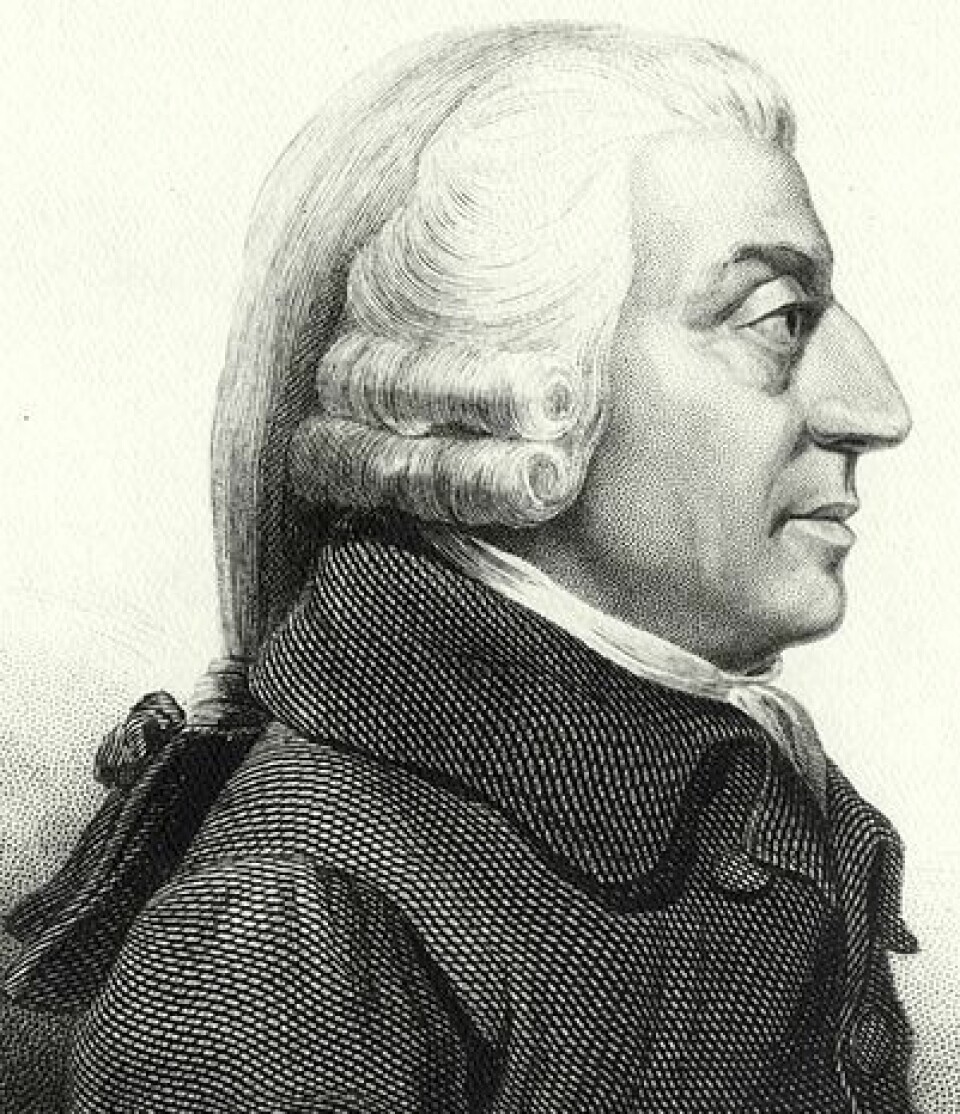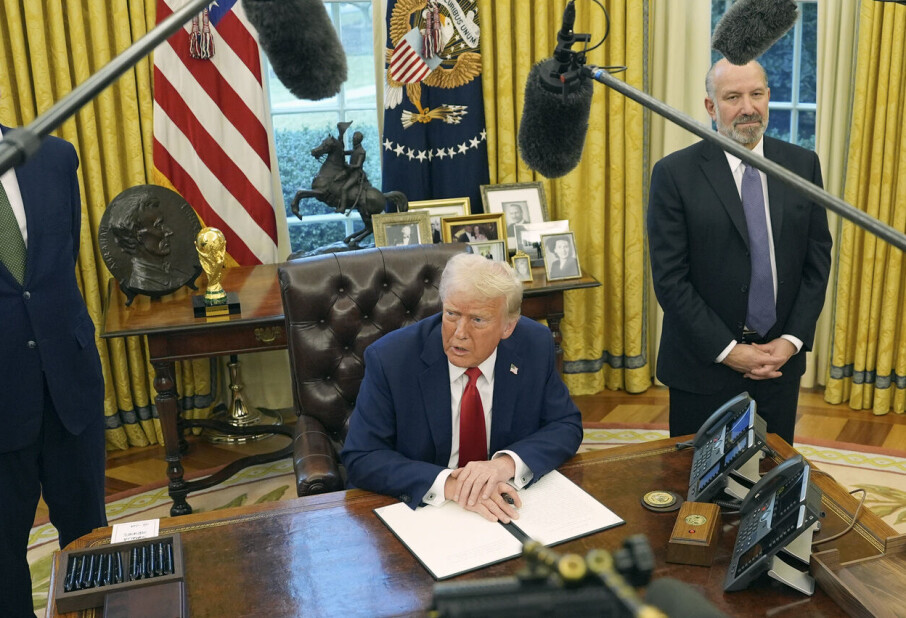
Adam Smith's ‘invisible hand’ is 300 years old
The father of economics, Adam Smith, changed the view of how values are created. But it is not self-interest and free markets that constitute the main message in Smith's work, professor believes.
Have you heard of the ‘invisible hand’?
The term is possibly the most well-known from Adam Smith’s book The Wealth of Nations. At least among non-economists.
Smith's main message is that specialisation and the division of labour were the keys to increasing wealth among nations. The markets come into play to make this possible.
Most viewed
No content
Smith believed that the demand for goods and services is best regulated in a free market.
Without the intervention of regulation-eager politicians.
The Scotsman Smith was born in 1723, so this year ‘Smith's friends’ can celebrate his 300th anniversary.
“But Smith only mentioned the term once in his book,” Einar Lie reveals. He is a social economist and professor of history at the University of Oslo.
The world's most famous book about economics
Smith did not consider it a central concept himself.
The Wealth of Nations is perhaps the most well-known book in the history of economic theory. Nevertheless, it is unlikely that many have read it in its entirety.
Einar Lie has.
At the economics festival Kåkånomics in Norway, he recently gave a crash course in Adam Smith's theories.
But how valid is what Smith believed now, 300 years later?
“Much of Adam Smith's philosophy is still valid,” Lie told sciencenorway.no in Stavanger before the lecture.
But Adam Smith must be interpreted primarily in the light of his time.
Groundbreaking
Smith's philosophy marked the beginning of economics as a discipline.

However, the book does not bear much resemblance to later economic books. In his time, Smith was best known as a philosopher.
“Smith offered long reasonings and anecdotes. The book is full of digressions that span several pages. He did not use numbers and analyses, but referred to a broad and diverse literature,” Lie says.
He has studied the work – which is over a thousand pages thick – page by page.
The book is groundbreaking in that Smith tells which mechanisms and connections govern economic activity. Or what creates prosperity in nations.
“It’s his systematic discussion of production, money, trade, markets, values, and prosperity that creates the new field of knowledge,” Lie explains.
Wild regulations and monopolies to life
The trade monopolies, guild system, and merchants with certain privileges of that time were problematic, Smith thought. He created the term mercantilism – a somewhat pejorative term Smith coined about the thinking of many of his predecessors.
Smith believed that markets generally do not need anyone to regulate or organise them.

“He believed competition keeps prices down and ensures that the goods are delivered with good quality. Otherwise, customers go elsewhere,” Lie explains.
This is where self-interest comes in. But it is a misconception that self-interest and free markets constitute the core of Smith's work, Lie believes.
The pin example
“Smith's key point is rather that specialisation and division of labour are the reasons for wealth,” Lie says.
Smith's example is a pin factory, where each worker specialised in certain parts of the production process. With specialisation, ten workers managed to produce tens of thousands of pins daily.
Production increased significantly compared to a scenario where each worker would have to perform every step of the process themselves. This ultimately benefited the consumers, as the price dropped significantly.
Monotonous
“What one can object to this today, is that it becomes very monotonous for the workers to do the same thing all day,” Lie points out.
Charlie Chaplin highlighted this issue by mocking the uniformity of the industrial age in Modern Times. But Smith lived in the trading era, before industrialism, Lie points out.
According to Smith, countries should also specialise in producing what they are best equipped to produce and instead import other goods, Lie explains.
The state less important
The politics of the time with protectionism, trade monopolies, and colonialism were supposed to ensure the state trade surplus and reserves in the form of precious metal. Smith had little taste for this.
Smith was more concerned with the sum of the wealth among the people in society than with the state's trade surplus.
It is the work of citizens that creates the wealth, he believed.
At that time, there were import regulations, tariff protection, and large export subsidies.
Smith was in favour of removing such regulations.
“Can he be interpreted as a right-wing man and liberal?”
“Not necessarily. He believed such regulations were a problem because they enriched the elite and large companies,” Lie says.
Opposed slavery and colonialism
Smith would probably have chuckled contently in his grave over the World Trade Organization's (WTO) work to dismantle tariff barriers. And the accompanying sanctions if you violate them.
What would he have thought about agricultural subsidies and import protection that we still maintain in Norway?
Smith thought such things were an obstacle to export. And that it would be more beneficial for us to import agricultural goods.
Lie notes that it is important to remember that Smith did not account for other objectives we value today, such as sustaining local communities and ensuring self-sufficiency.
Smith was against the slave trade and colonialism.
“In that way you can say that Smith was ahead of his time. Not for humanitarian reasons. But because he thought it wasn't profitable,” Lie says.
An important inspiration
Lie believes that Smith's greatest importance lies in the clear inspiration he provided for the economists who followed in his footsteps.
But he was no naive supporter of unregulated markets.
“Even he saw the danger of large monopolies forming. And he feared various forms of influence between economic interests and state power,” Lie says.
He thinks that Smith might well have recognised the need for later forms of competition regulations and consumer protection.
———
Translated by Alette Bjordal Gjellesvik
Read the Norwegian version of this article on forskning.no
Reference:
The classic: Adam Smith in 45 minutes with Einar Lie. Kåkå-nomics, 27 October 2023.
































